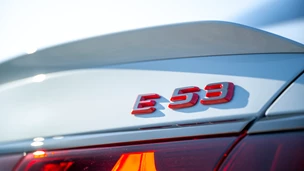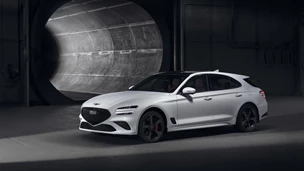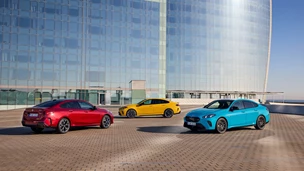The Peugeot 308 is a game changer for the French company. It has a more Germanic look to it and the interior is of a much better quality than anything that we have previously seen from the carmaker.
Peugeot is taking aim at the heavyweights in this division, including the Ford Focus and the VW Golf.
The 308 has already received plaudits for revitalising Peugeot’s hatchback chops, receiving the accolade of European Car of the Year 2014.
Performance
There is plenty to choose from in the 308, both from a petrol and diesel point of view. Options include a 1.6-litre with either 125bhp or 155bhp power outputs, as well as 1.6-litre e-HDi (115bhp) diesel.
Highlights of the range include the 155bhp derivative of the 1.6-litre petrol. This can get from zero to 62mph in 8.4 seconds while it has a top speed of 132mph.
The most powerful diesel engine, 115bhp 1.6-litre e-HDi, will reach the benchmark sprint in 11.9 seconds and will go on to 118mph.
The three-cylinder 1.2-litre e-THP 129bhp is a particularly impressive unit and seems to do everything pretty well.
It's powerful for its size, so it makes the car quick enough for all normal motoring situations. The way the little turbocharged 1.2-litre behaves at speeds as low as 1,200rpm struck us as being particularly impressive. It's also very quiet - only when you're accelerating hard, or climbing a steep hill, do you become fully aware of the characteristic three-cylinder beat.
Ride and Handling
The 308 is fun to drive, the weighting on the steering is good but feels a little artificial and the feedback could be better.
The latest generation Peugeot 308 is a massive improvement on the previous generation. It has shed 140kg when compared to its predecessor enhancing agility and performance. The handling credentials are much improved and inside, the cabin is accentuated by the small steering wheel which was first seen in the Peugeot 208. The 308 is fun to drive, the weighting on the steering is good but feels a little artificial and the feedback could be better. It’s not as much fun as a Ford Focus, however, it has better ride comfort than a BMW 1 Series. This generation 308 is brilliant on long journeys thanks to the supple ride and when driving enthusiastically the all-new 308 holds its own. Although the suspension is good, if you encounter two bumps in quick succession the ride becomes a little unsettled as it fails to recover quick enough from the first by the time it reaches the second.
Interior and Equipment
To reduce weight and increase agility, the Peugeot 308 was built with a plastic boot.
Four trims are available on the all-new Peugeot 308 starting with the entry-level Access, moving up to the Active, then Allure with the flagship Feline range. Standard kit on the entry-level Access grade gives you manual air conditioning, DAB radio and Bluetooth connectivity. Move up to the Active trim and this adds 16-inch alloy wheels and a 9.7-inch touch screen that gadget fans will love. It controls the audio, Bluetooth interface and aircon, removing the need for a cluster of buttons on the central console. If you climb to the top of the range, the flagship Feline grade gets all of the above plus a panoramic sunroof with a full-length electrically powered blind, 18-inch alloys, Alcantara trim on the interior and a driver comfort pack that includes cruise control, emergency collision alert and emergency collision braking system. One of the best features on the all-new 308 is the amount of practicality it offers to families. The load space now stands at 470 litres of load space. At present that is the biggest amount of load space in the class as the Ford Focus only offers 316 with its rear bench in place while VW’s Golf offers 380 litres with the rear bench in place. Fold the rear bench flat in the 308 and the luggage space expands to 1,309 litres. General comfort in the cabin is jeopardised a little by its bad visibility due to thick A pillars. The VW Golf is much better in the visibility department. There are however plenty of convenient cubby holes to stow your keys, phone and snacks.
Cost
The premium you pay for the Golf however, should pay off in terms of residuals – so bear that in mind if you are considering the German route.
The most frugal engine available in the 308 range is the 1.6-litre HDI 92 diesel engine, with Peugeot claiming it returns a combined 78.5mpg and emits as low as 82g/km of CO2, making it a very appealing option for families and company car drivers. In fact, if you are a company car driver and looking at the P308 with the 1.6-litre HDI 92 diesel engine, it carries a low BIK taxation rate of just 14% for 2014/2015. In terms of price tag, the 308 starts from £14,895, meaning it is a hefty chunk less than the VW Golf. It is however more expensive than the Vauxhall Astra and Ford Focus. The premium you pay for the Golf however, should pay off in terms of residuals – so bear that in mind if you are considering the German route.
Our Verdict
The Peugeot 308 offers more practicality than it main rivals. Pick any trim with exception of the entry-level Access and you’ll see that the cabin has become more upmarket. It’s almost Germanic in design, which is a major compliment to the French maker. Its wide range of options also means there is something for everyone, from cheap-to-insure three-cylinder petrol engines, to high-powered ones, and let’s not forget its incredibly frugal diesels. The 308 may favour those who want something a bit different from the usual Focus and Astra suspects, but also something that is less pricy than a Golf. One thing is for sure. Peugeot has knocked it out the park with this one.




